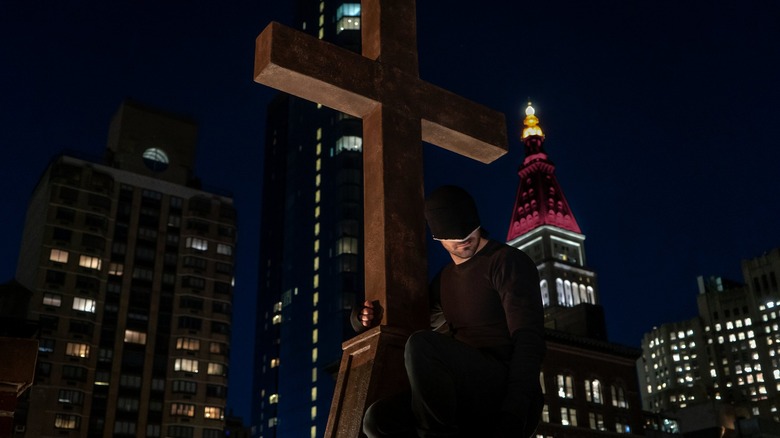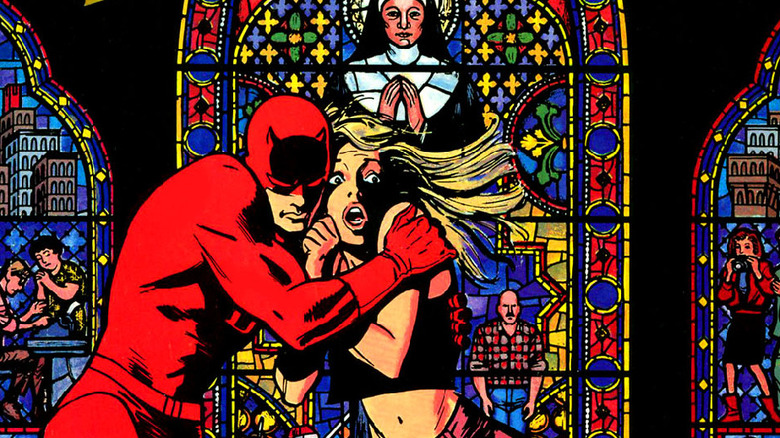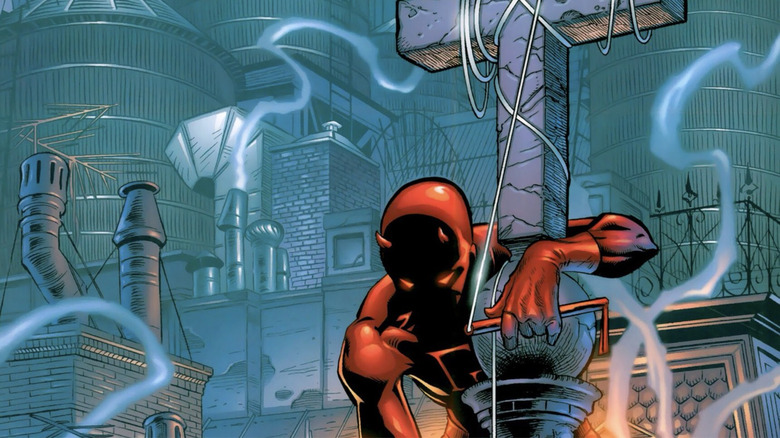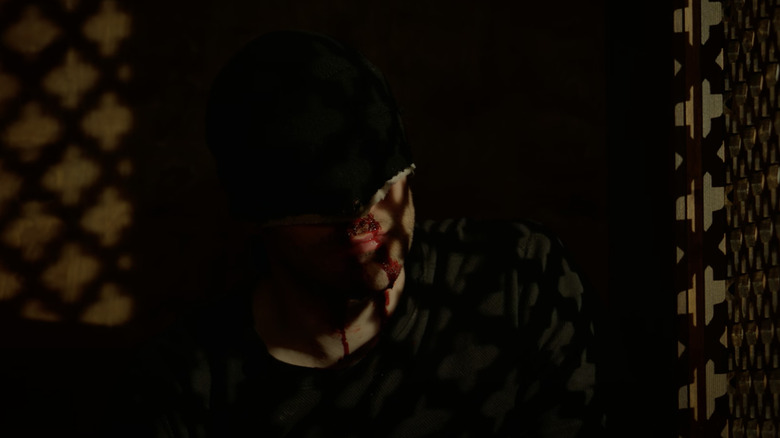Why Frank Miller Wrote Marvel's Daredevil As A Catholic
"Daredevil" issue #1 was published in 1964, credited to Stan Lee and Bill Everett. However, for many, "Daredevil" didn't truly begin until Frank Miller took over the book in 1980. His run is where the Kingpin became Daredevil's nemesis and where Elektra was introduced. These are such foundational characters to subsequent "Daredevil" comics/adaptations that the first two decades without them feel like an anomaly.
Influenced by noir movies, Miller brought the grit to Hell's Kitchen. His narration captions were straight out of a detective dime novel. His art broke from the Bronze Age Marvel Comics house style with darker shading (inked mostly by Klaus Janson), hatch marks, and blood-splattered violence, further adding to the dark atmosphere of the writing.
Miller's run also began the edict "Matt Murdock must suffer." His love story with Elektra is a tragedy, and in Miller's ending arc "Born Again," Matt loses everything. Not coincidentally, Miller was the writer to canonize Matt Murdock as a Catholic. There's some disagreement if he was the first to suggest this, but Miller brought faith to the forefront. In "Born Again," Matt meets the nun Sister Maggie, who is implied to be his biological mother. She nurses him back to health and his return as Daredevil is like a baptism in fire.
"Murdock" is a name with Gaelic roots. An Irish-American growing up in New York City in the 20th century? It'd make less sense for Matt to not be a Catholic. It goes deeper than that, though. Miller was interviewed for the documentary "The Men Without Fear: Creating Daredevil" (made in conjunction with the 2003 "Daredevil" movie), where he explained:
"I decided [Daredevil] had to be a Catholic because only a Catholic could be a vigilante and an attorney at the same time."
So, what did Miller mean by that?
Daredevil, the hero of contradictions
Comic writer Chip Zdarsky (who completed an excellent run on "Daredevil" last year) was asked by Forbidden Planet TV to explain the appeal of Daredevil. Zdarsky's take:
"[Daredevil is] just a man of conflicts. That's what makes him so interesting to write. He's the good Catholic boy who dresses as the Devil. He's the lawyer who holds up the law who goes out every night and breaks the law. The man of peace who's violent. There's so much to play with there."
Some of the contradictions that Zdarsky mentions have been there from the beginning. In "Daredevil" #1, Matt adopts a disguise to avenge his father's murder because he'd promised his old man he wouldn't use his fists to solve problems. However, the irony of a good guy dressed like the embodiment of evil? That took a while for writers to highlight. Lee certainly didn't understand the thematic gold mine he'd created (to be fair, Lee was Jewish, not a Christian who would have been raised fearing the Devil); Daredevil's original costume was yellow and black, not the Satanic red it's become since.
Zdarsky's analysis gets to the heart of Miller's quote. Matt is compelled to do good and he thinks isn't doing enough of it as a lawyer. To do more good, he feels he has to break both the law and the tenets of his faith, two codes he holds dear. Thus, he self-flagellates by making his vigilante self a "devil." The self-important hypocrisy (and the self-endangerment) of his actions are specifically Catholic.
Marvel's Catholic superhero
You might have heard of "Catholic Guilt," and trust me, it's real even if you no longer practice. I think a lot of it goes back to Confession, the ritual where we recite our sins before a priest and he prescribes spiritual remedies. By saying your faults out loud with someone else present, it's impossible to deny them. Your conscience becomes heavier and the corrective acts prescribed to you never feel completed. Frankly, part of the practice is control; it keeps Catholic followers in line with the Church (confess or be damned) and has been used to corrupt ends.
Still, I feel this Sacrament underlines one of the key differences between Catholics and, say, Protestants who believe in predestination (that one's afterlife is already decided by God no matter what you do on Earth). Catholics instead stress responsibility; we're naturally tainted by Original Sin and it's our job to take stock of our vices, keep them in check, and atone when we don't. Confession shouldn't stop at the booth either, but shape how you live your life in a more holy direction. It's like Martin Scorsese writes in the opening of his 1973 film "Mean Streets" (recited in narration by Harvey Keitel): "You don't make up for your sins in church. You do it in the streets. You do it at home. The rest is bulls*** and you know it."
As Daredevil, Matt is constantly torn apart by internal conflict (he's breaking rules that his soul tells him to follow), but he keeps going out every night because he also tells himself things will be worse if he doesn't. He carries a cross of his own choosing because, like any Catholic, he feels most at ease as a martyr.
Continuing Miller's Daredevil
Every Daredevil writer since Miller has trodden in the footsteps he left — and amazingly, most of them have done a pretty good job ("Daredevil" is a contender for Marvel's most consistently excellent ongoing comic). That means Catholicism has endured as part of the comic's ethos, though some writers highlight it more than others. Zdarsky's run is about Matt being challenged on how his ideals and his actions align (or don't). At the run's end, an amnesiac Matt has become a priest, but the ending suggests he'll be just as compromised as a man of God as he was as a man of the law.
In Netflix's "Daredevil" series, Matt's priest Father Lantom (Peter McRobbie) is a recurring character. One of the first scenes is Matt in a confession booth, trying to explain his vigilantism as an undeniable urge: "I'm not seeking penance for what I've done, Father. I'm asking forgiveness for what I'm about to do."
In the 2022 comic crossover event "Judgment Day" (written by Kieron Gillen), a Celestial comes to judge humanity, one by one. The story is centered on the Avengers, X-Men, and Eternals, yet issue #4 focuses on Daredevil for just a moment. The Celestial's judgment explains in four sentences what some comics have taken whole arcs to spell out:
"Matt Murdock dresses like a devil and tries to stop the streets from becoming Hell. He is a man with a firm moral code, which he has violated time and time over. I appear with a crown of thorns and a downturned thumb. Beneath the mask, he weeps, says I know, yet carries on."
The laws that Matt Murdock observes, legal and spiritual, often stress conviction over action. Daredevil suffers inside because he values the inverse, yet this contradiction reveals his goodness. He cares about saving others' souls more than his own.



